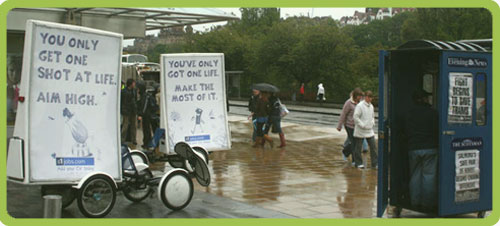You’ve been applying for jobs for weeks, months, or maybe even more and yet you’re still unemployed and continually receiving rejection letters from potential employers - why is that?
In the current economic climate it is easy to blame the recession but here are some other reasons as to why you may be having trouble finding a job:You're not committed to getting hired.
Many people fail to adopt a committed, passionate, failure-is-not-an-option attitude towards searching for a job. They do not realise that job hunting is a numbers game. The more opportunities you try out, the more interviews you attend, the better your chances of getting called back and eventually getting hired.
You Ignore Small Opportunities.
Some applicants ignore vacancies from small businesses thinking that it’s not where they should belong. Do not belittle such companies as they can actually offer a stable job for you. In small businesses, competition among applicants might be smaller too.

You’re Applying for the Wrong Position.
Sometimes it’s being impractical that makes it difficult for job seekers to get hired. They apply for positions which do not fit them. You may want a position so badly but you have to consider if you’re qualified for it. You have higher chances of winning the job if the job fits your credentials, work experiences, and educational background. Prioritise vacancies in which you already have an edge. Be practical and realistic in selecting the positions to apply for.
You have a faulty CV.
Little errors in your CV or resume such as typographical errors or grammatical errors can lead to rejected applications. Your CV is your initial marketing tool for the company. It should sell yourself well in order for the hiring manager to call you for an interview. If you fail to submit a good CV, then your chances of getting hired is very low.
You don't prepare well for interviews.
Most people are either not confident in themselves or act too arrogantly in the interviewing process simply because they are not as prepared as they should be. They don't prepare and practice presentations either by themselves or with others.
You Don't Display Good Conduct and Professionalism.
Some applicants think that their impressive CV is enough to get them hired. Despite your stunning credentials, you’d still fail to win the job if you display poor conduct during interviews. Employers carefully look at each applicant’s conduct and behavior during interviews. Applicants who display professionalism and good conduct always have the advantage.
 You dress only to impress and not for success.
You dress only to impress and not for success.An applicant’s overall look is very important during interviews. Employers look at the overall package and not just how well an applicant can perform a certain position. A common mistake among aspiring applicants is being too fancy on what they wear during interviews. They tend to wear too many accessories to impress their interviewers. Some would wear inappropriate attire just to look gorgeous, neglecting the proper dress code for the occasion. During interviews, simply dress for success! In the end, you’ll still be able to make a good impression of yourself to the interviewers.
These are just some pointers you might want to look at to improve your job hunting skills. For more detailed information, I strongly recommend Job Search Success that will help you to get a great job despite the recession.
Take a look at now:
WARNING: Did you know it takes an average of 17 job interviews to land 1 job OFFER? Not anymore!...Discover what this "Secret Career Document" can do for your job search...













